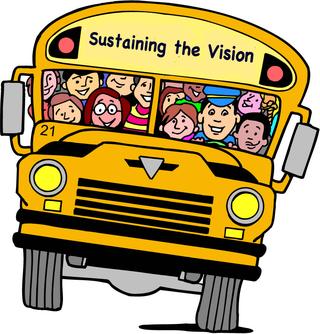Sustaining the Vision Section
 Because of rapidly evolving technology and decreasing budgets, educational institutions will need to learn to adapt to change and partner with business, non profit organizations, government and communities both locally and globally. In an increasingly networked world where learning is everywhere at anytime, educational leaders must position education as the central hub that facilitates learning throughout communities. No longer the sole gatekeepers of knowledge, they must become the experts who facilitate, advise, oversee and partner with communities in the new learning community.
Because of rapidly evolving technology and decreasing budgets, educational institutions will need to learn to adapt to change and partner with business, non profit organizations, government and communities both locally and globally. In an increasingly networked world where learning is everywhere at anytime, educational leaders must position education as the central hub that facilitates learning throughout communities. No longer the sole gatekeepers of knowledge, they must become the experts who facilitate, advise, oversee and partner with communities in the new learning community.
According to Cisco's The Learning Society White Paper the demands of life long learning will require new models of funding that encourage investment. " Investing in learning should be tax-efficient for individuals and their employers. For those out of work, funds should be created to incentivize learning. Governments should use regulation and taxation to encourage financial institutions to develop new financial instruments that allow learners to access opportunities when they need them most. They can do this by lowering cost, reducing risk, and smoothing repayments."
While some money will still come from government to support education, schools will need to find more efficient ways to be sustainable. Specifically, they will have to maximize the use of their physical properties. One way to do that is through schools that are also open to community activities and needs. For example, a school may not only have after school programs, but may be a community health centre or child care facility. Schools with athletic facilities may be used as athletic centres on off school hours. Curriculum will need to offer authentic real world projects that encourage students to work on projects in school and outside schools within communities. Sharing resources and working on community projects will be a key to growing partnerships. Schools will also need to create partnerships with other schools to share resources and technological facilities and infrastructures. Schools need to develop networked support systems that encourage continuous innovation to adapt to change.
Funding opportunities will need to be sought from business and the community. Special attention will need to be paid to the emerging trends predicted by organizations like the Horizon Report. While funders will be interested in supporting new technological trends, it will be the responsibility of the schools to ensure that projects suggested not only use new technology but also have sound pedagogical principles that encourage authentic learning for the whole learner. Learning will be more authentic when projects involve multiple subject areas.
While Data Driven Decision Making will remain important, schools will need to rethink the amount and types of testing that needs to be done to ensure continuous improvement. Any testing will need to evaluate critical thinking, problem solving skills and authentic learning. With the adoption of newer models of education like blended and online learning, curriculum will be more personalized and under the direction of the learner. With portions of the curriculum tailored to learners in online learning modules, data can be used that will track learners' progress. The data from these types of tracked and monitored learning situations will in time supplant some of the standardized tests.
All those working in the field of education, administrators, teachers, support workers will need to model continuous learning. Through the use of personal learning networks and professional development, those in education will need to understand and continue to develop 21st century learning skills in order to present innovative curriculum for learners. It is not just teachers who need to continue the learning process. It is everyone in the learning institutions and the community.
"It’s true that optimizing the effectiveness of traditional education systems to maximize the value we can derive from them is a vital element of any strategy moving forward. But this is not enough. Learning is an activity not a place and goes beyond the school and the university; it always has. The knowledge explosion, driven by the power of the network to connect people and spread ideas, has changed the very nature of learning. We must innovate and develop new modes of learning, both formal and informal,that meet the demands of knowledge-driven societies in this Information Age...The future of education is networked." (John Chambers, The Learning Society)
In this section, we introduce motivation and transcendent purpose; data driven decision making; flexibility, differentiation and restructuring; financing; partnerships; professional development and personal learning networks to sustain the vision of Education 2020.
Next up, Motivation and Transcendent Purpose
